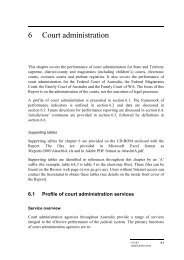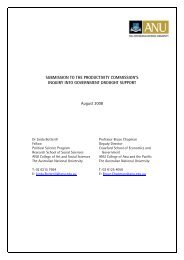Dr Emma Aisbett and Jonathan Bonnitcha (PDF - 202 - Productivity ...
Dr Emma Aisbett and Jonathan Bonnitcha (PDF - 202 - Productivity ...
Dr Emma Aisbett and Jonathan Bonnitcha (PDF - 202 - Productivity ...
You also want an ePaper? Increase the reach of your titles
YUMPU automatically turns print PDFs into web optimized ePapers that Google loves.
Third, we recommend that investor‐state dispute settlement (ISDS) be removed from Australia’s<br />
basic negotiating position. Any decision to include it in a particular FTA should be justified by a<br />
specific cost‐benefit analysis examining the merits of its inclusion in the treaty in question. We make<br />
this recommendation because the majority of the costs of post‐establishment protection flow from<br />
the ability of a foreign investor to enforce their rights under a treaty, whereas the benefits – to the<br />
extent they exist – are not necessarily tied to enforceability. It is true that Australia would be bound<br />
– as a matter of international law – by the obligations to which it agrees, even in the absence of<br />
investor‐state dispute settlement. However, it is clear that enforceability is enormously important in<br />
practice. There are dozens of cases in which an investor has been awarded compensation through<br />
ISDS for a state’s failure to provide fair <strong>and</strong> equitable treatment. We know of no cases in which a<br />
state has conceded that it has failed to provide fair <strong>and</strong> equitable treatment <strong>and</strong> offered<br />
compensation to an investor in the absence of ISDS.<br />
Finally, we recommend redrafting of the provision that requires a state to offer an investor fair <strong>and</strong><br />
equitable treatment. Arbitral decisions have interpreted this st<strong>and</strong>ard particularly broadly. For<br />
example, a number of decisions have required host states to compensate foreign investor for<br />
breaches of their ‘legitimate expectations’, even when these expectations have no legal basis. 25 An<br />
investor would not be able to gain compensation for a breach of their legitimate expectations under<br />
Australian administrative law. 26 Australia’s treaty practice has responded to this concern by stating<br />
that fair <strong>and</strong> equitable treatment does not place obligations on a state that go beyond the minimum<br />
st<strong>and</strong>ard of treatment of aliens required by customary international law. 27 This is a welcome change<br />
in drafting practice, but it creates new confusion. In the past, the fair <strong>and</strong> equitable treatment<br />
st<strong>and</strong>ard has been interpreted as going beyond the customary minimum st<strong>and</strong>ard. Suggesting that<br />
fair <strong>and</strong> equitable treatment is the same thing as the minimum st<strong>and</strong>ard creates a risk that arbitral<br />
tribunals may conclude that states intend to imply that past decisions on fair <strong>and</strong> equitable<br />
treatment define a new, higher customary international law st<strong>and</strong>ard. We recommend that this<br />
provision omit any reference to fair <strong>and</strong> equitable treatment <strong>and</strong>, instead, refer only to the<br />
customary international law minimum st<strong>and</strong>ard of treatment for aliens.<br />
25 International Thunderbird Gaming Corporation v. Mexico, UNCITRAL (NAFTA), 26 January 2006, [147].<br />
26 Re Minister for Immigration <strong>and</strong> Multicultural <strong>and</strong> Indigenous Affairs; Ex parte Lam (2003) 214 CLR 1, [67]<br />
per McHugh, Gummow JJ.<br />
27 See, for example, Chapter 11 – Article 6 (2) c) of the Australia – ASEAN – NZ FTA.

















